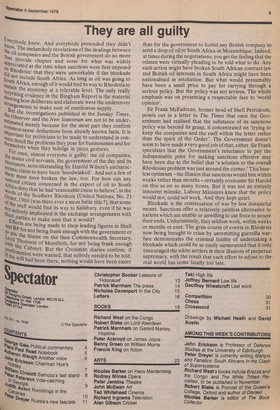They are all guilty
Everybody knew. And everybody pretended they didn't ,Itt110w. The melancholy revelations of the dealings between Lae oil companies and the British government do no more than provide chapter and verse for what was widely appreciated at the time when sanctions were first imposed 0.,r1 Rhodesia: that they were unworkable if the blockade nuld not include South Africa. As long as oil was going to 4iiith Africa, enough of it would find its way to Rhodesia to sustain the economy at a tolerable level. The only really surprising evidence in the Bingham Report is the material Showing how deliberate and elaborate were the undercover grrangements to make sure of continuous supply. ,J3tit the investigations published in the Sunday Times, _me. Observer and the New Statesman are not to be underestimated merely because for the most part they confirm e .orninon-sense deductions from already known facts. It is , _gl1Portant for politicians to be made to understand in con4e,tete detail the problems they pose for businessmen and for "leinselves when they indulge in pious gestures.
the once, almost everyone is guilty: the oil companies, ,""e senior civil servants, the government of the day and its ,'11.c.cessors, notwithstanding Sir Harold Wilson's uncharacteristic claim to have been 'hoodwinked'. And not uncharacteristic..ne.n1 must have broken the law, too. For how can any Africa citizen concerned in the export of oil to South _Africa deny that he had 'reasonable cause to believe', in the Words of the Southern Rhodesia (United Nations, No. 2) Order, (was there ever a more futile title?), that some _1 the stuff would find its way to Salisbury, even if he was 11t,n.t actively implicated in the exchange arrangements with • "1d parties to make sure that it would?
efforts are being made to shop leading figures in Shell
a it,sid B. P for not being frank enough with the government or II' Pin the blame on the then Commonwealth Secretary, ;iti.rd Thomson of Monifieth, for not being frank enough en, With the Cabinet. But the Crossman diaries confirm, if iFlni'mation were wanted, that nobody needed to be told. the Will had been there, nothing would have been easier
than for the government to forbid any British company to send a drop of oil to South Africa or Mozambique. Indeed, at times during the negotiations, you get the feeling that the oilmen were virtually pleading to be told what to do. Any such action might have broken South African contract law and British oil interests in South Africa might have been nationalised in retaliation. But what would presumably have been a small price to pay for carrying through a serious policy. But the policy was not serious. The whole emphasis was on presenting a respectable face to 'world opinion'.
Sir Frank McFadzean, former head of Shell Petroleum, points out in a letter to The Times that once the Governinent had realised that the substance of its sanctions policy was beyond its grasp, it concentrated on 'trying to keep the companies and the staff within the letter rather than the spirit of the Order'. The Government doesn't seem to have made a very good job of that, either. Sir Frank speculates that the Government's reluctance to pay the indispensable price for making sanctions effective may have been due to the belief that 'a solution to the overall Rhodesian problem was just around the corner.' This baseless optimisnt —the illusion that sanctions would bite within weeks rather than months — certainly overcame Sir Harold
on this as on so many fronts. But it was not an entirely innocent mistake. Labour Ministers knew that the policy would not, could not work. And they kept quiet.
Blockade is the continuation of war by less distasteful means. Sanctions offer a relatively painless alternative to nations which are unable or unwilling to use force to secure their ends. Unfortunately, they seldom work, within weeks or months or ever. The grim course of events in Rhodesia now being brought to crisis by unremitting guerrilla war fare demonstrates the criminal futility of undertaking a blockade which could be so easily surmounted that it only encouraged the white settlers in their illusions of perpetual supremacy, with the result that each effort to adjust to the real world has come fatally too late.


































 Previous page
Previous page